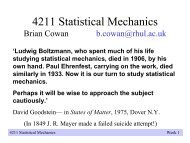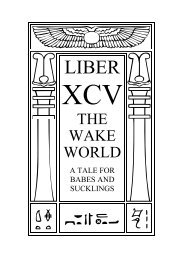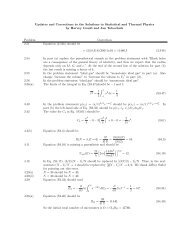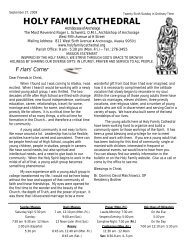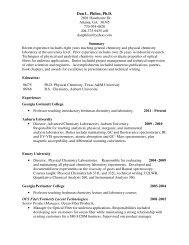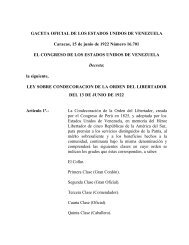Manifesto of the Communist Party - WebRing
Manifesto of the Communist Party - WebRing
Manifesto of the Communist Party - WebRing
Create successful ePaper yourself
Turn your PDF publications into a flip-book with our unique Google optimized e-Paper software.
<strong>the</strong> February Revolution, <strong>the</strong> <strong>Manifesto</strong> too passed into <strong>the</strong> background.<br />
page 20<br />
When <strong>the</strong> working class <strong>of</strong> Europe had again ga<strong>the</strong>red sufficient strength for a new onslaught<br />
upon <strong>the</strong> power <strong>of</strong> <strong>the</strong> ruling classes, <strong>the</strong> International Working Men's Association came into<br />
being. Its aim was to weld toge<strong>the</strong>r into one huge army <strong>the</strong> whole militant working class <strong>of</strong> Europe<br />
and America. Therefore it could not set out from <strong>the</strong> principles laid down in <strong>the</strong> <strong>Manifesto</strong>. It was<br />
bound to have a program which would not shut <strong>the</strong> door on <strong>the</strong> English trades' unions, <strong>the</strong> French,<br />
Belgian, Italian and Spanish Proudhonists and <strong>the</strong> German Lassalleans.[*] This program -- <strong>the</strong><br />
preamble to <strong>the</strong> Rules <strong>of</strong> <strong>the</strong> International -- was drawn up by Marx with a master hand<br />
acknowledged even by Bakunin and <strong>the</strong> Anarchists. For <strong>the</strong> ultimate triumph <strong>of</strong> <strong>the</strong> ideas set forth<br />
in <strong>the</strong> <strong>Manifesto</strong> Marx relied solely and exclusively upon <strong>the</strong> intellectual development <strong>of</strong> <strong>the</strong><br />
working class, as it necessarily had to ensue from united action and discussion. The events and<br />
vicissitudes in <strong>the</strong> struggle against capital, <strong>the</strong> defeats even more than <strong>the</strong> successes, could not but<br />
demonstrate to <strong>the</strong> fighters <strong>the</strong> inadequacy hi<strong>the</strong>rto <strong>of</strong> <strong>the</strong>ir universal panaceas and make <strong>the</strong>ir<br />
minds more receptive to a thorough understanding <strong>of</strong> <strong>the</strong> true conditions for <strong>the</strong> emancipation <strong>of</strong><br />
<strong>the</strong> workers. And Marx was right. The working class <strong>of</strong> 1874, at <strong>the</strong> dissolution <strong>of</strong> <strong>the</strong><br />
International, was altoge<strong>the</strong>r different from that <strong>of</strong> 1864, at its foundation. Proudhonism in <strong>the</strong><br />
Latin countries and <strong>the</strong> specific<br />
* Lassalle personally, to us, always acknowledged himself to be a "disciple" <strong>of</strong> Marx, and, as such, stood, <strong>of</strong><br />
course, on <strong>the</strong> ground <strong>of</strong> <strong>the</strong> <strong>Manifesto</strong>. Matters were quite different with regard to those <strong>of</strong> his followers who did<br />
not go beyond his demand for producers' co-operstives supported by state credits and who divided <strong>the</strong> whole<br />
working class into supporters <strong>of</strong> state assistance and supporters <strong>of</strong> self-assistance. [Note by Engels.]<br />
Lassalleanism in Germany were dying out, and even <strong>the</strong> <strong>the</strong>n arch-conservative English trades'<br />
unions were gradually ap proaching <strong>the</strong> point where in 1887 <strong>the</strong> chairman <strong>of</strong> <strong>the</strong>ir Swansea<br />
Congress could say in <strong>the</strong>ir name: "Continental Socialism has lost its terrors for us." Yet by 1887<br />
Continental Socialism was almost exclusively <strong>the</strong> <strong>the</strong>ory heralded in <strong>the</strong> <strong>Manifesto</strong>. Thus, to a<br />
certain extent, <strong>the</strong> history <strong>of</strong> <strong>the</strong> <strong>Manifesto</strong> reflects <strong>the</strong> history <strong>of</strong> <strong>the</strong> modern working-class<br />
movement since 1848. At present it is doubtless <strong>the</strong> most widely circulated, <strong>the</strong> most international<br />
product <strong>of</strong> all Socialist literature, <strong>the</strong> common program <strong>of</strong> many millions <strong>of</strong> workers <strong>of</strong> all<br />
countries, from Siberia to California.<br />
page 21<br />
Never<strong>the</strong>less, when it appeared we could not have called it a Socialist <strong>Manifesto</strong>. In 1847 two<br />
kinds <strong>of</strong> people were considered Socialists. On <strong>the</strong> one hand were <strong>the</strong> adherents <strong>of</strong> <strong>the</strong> various<br />
utopian systems, notably <strong>the</strong> Owenites in England and <strong>the</strong> Fourierists in France, both <strong>of</strong> whom at<br />
that date had already dwindled to mere sects gradually dying out. On <strong>the</strong> o<strong>the</strong>r, <strong>the</strong> manifold types<br />
<strong>of</strong> social quacks who wanted to eliminate social abuses through <strong>the</strong>ir various universal panaceas<br />
and all kinds <strong>of</strong> patchwork, without hurting capital and pr<strong>of</strong>it in <strong>the</strong> least. In both cases, people<br />
who stood outside <strong>the</strong> labour movement and who looked for support ra<strong>the</strong>r to <strong>the</strong> "educated"<br />
classes. The section <strong>of</strong> <strong>the</strong> working class, however, which demanded a radical reconstruction <strong>of</strong><br />
society, convinced that mere political revolutions were not enough, <strong>the</strong>n called itself <strong>Communist</strong>. It<br />
was still a rough-hewn, only instinctive, and frequently somewhat crude Communism. Yet it was<br />
powerful enough to bring into being two systems <strong>of</strong> utopian Communism -- in France <strong>the</strong> "Icarian"<br />
Communism <strong>of</strong> Cabet, and in Germany that <strong>of</strong> Weitling. Socialism in 1847 signified a bourgeois



